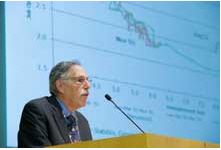
Typical street scene in Santa Ana, El Salvador. (Photo: iStock)
IMF Survey: Growth Is Key to Job Creation, IMF Conference Finds
November 21, 2012
- IMF conference discusses how best to create jobs in aftermath of recession
- Raising aggregate demand, strengthening financial intermediation remain critical
- Taxes can be effective way to mitigate income inequality without stifling growth
As the jobless rate has soared in most advanced economies in the wake of the Great Recession, especially for young people, how labor markets work and how policy can influence them has taken on new urgency.

Peter Diamond gives Mundell-Fleming lecture at IMF Annual Research Conference. Jobs, inequality were topics discussed (photo: Stephen Jaffe/IMF)
ANNUAL RESEARCH CONFERENCE
Participants in the Thirteenth Jacques Polak Annual Research Conference hosted by the IMF at its Washington DC headquarters on November 8 and 9 discussed recent research on critical labor market problems. The aim was to figure out the best way to create jobs and reduce inequality.
Matching skills
Nobel prize winner George Akerlof argued in his opening remarks (which you can watch) that most unemployment is caused by changes in demand, rather than by so-called structural issues pertaining to employees’ qualifications, location, and/or age. This means that “aggregate demand shocks”—changes to the economy that affect all such groups at the same time—are the key to remedying unemployment.
While structural government policies that facilitate job matching, for example, or help people move to where the jobs can help, they are less important than those that support overall demand, according to Akerlof.
“The road to bliss is not through austerity,’’ concluded Akerlof.
This contrasts with an increasingly popular view in policy circles that the recent crisis has severed links between output and employment recovery, implying that even healthy output growth will fail to reduce unemployment to precrisis levels.
In the conference’s keynote Mundell-Fleming lecture (which you can watch), Peter Diamond, MIT professor and also a Nobel laureate, noted that skills matching and other structural frictions reduce the scope for monetary and fiscal policy in job recovery, but there is evidence that unemployment has a sizable cyclical component that can be sometimes misconstrued as being “structural.” If so, fiscal and monetary policies geared toward fostering consumption and investment both at home and abroad are all the more important as countercyclical tools in employment recovery.
Stronger product markets
This message was aligned with recent empirical evidence on the link between dwindling product markets and rising unemployment. Professor Laurence Ball of Johns Hopkins University, with IMF researchers Daniel Leigh and Prakash Loungani, showed that the so-called Okun’s law—which postulates that a 1 percentage point deviation in output from trend leads to a ½ percentage point deviation in unemployment from its “natural” level—has been reasonably stable in the United States since 1948, and also broadly holds true for other advanced economies. Hence, rising aggregate demand and stronger product markets are a necessary condition for healthier labor markets.
In addition to Peter Diamond’s discussion, participants presented additional international evidence on the Beveridge curve, which measures skill mismatches by mapping the relationship between the number of job vacancies and the unemployment rate.
Bart Hobijn and Aysegul Sahin from the U.S. Federal Reserve (Fed) found that skills mismatching may be playing a greater role since the start of the global financial crisis, adding as much as 2.8 percentage points to the U.S. unemployment rate. Declines in matching efficiency are consistent with deep recessions leading to abnormal labor displacement across sectors, and can be exacerbated by more generous unemployment insurance schemes though the importance of the latter can be easily exaggerated. This may however be a temporary effect.
In the discussion of this paper, others argued that the results of this study might reflect longer-lasting factors such as being geographically “trapped” by home ownership during a period of falling housing prices and illiquid property markets. Indeed, Hobjin and Sahin’s own study indicates that housing market developments have been important in explaining unemployment in many European countries.
Taxing the wealthy
The income share held by the top 1 percent has risen sharply in the United States and the United Kingdom since 1980, noted Thomas Piketty of the University of Paris, presenting work he has done with Emanuel Saez of University of California at Berkeley. The rise in income inequality has been associated with sharply rising wealth-to-income ratios, which suggests that inequality can be largely mitigated by more progressive taxation to discourage the negotiation of extremely high salaries.
Olivier Coibion of the University of Texas and the IMF and his co-authors presented evidence suggesting that monetary policy can potentially foster inequality, among other things by transferring resources (via higher real interest rates) from poorer borrowers to richer savers.
Role of credit
The role of the credit channel in job creation and destruction was hotly debated at the conference. The sharp drop in house prices has played an important role, especially in the United States, in reducing available business financing. This in turn has made businesses less likely to hire.
New and small businesses are particularly sensitive to housing price variations than other businesses, according to University of Maryland professor John Haltiwanger, which explains the concentration of job losses by that group of businesses since the start of the crisis.
Kyle Herknhoff and Lee Ohanian of UCLA investigated the roles of mortgage default and foreclosure delays in smoothing consumption and lengthening employment searches, potentially exacerbating unemployment. Tito Boeri from Bocconi University and co-authors found evidence from both sides of the Atlantic that, in a recession, more heavily leveraged firms face greater difficulties in rolling over debt and tend to cut significantly more jobs. It follows that strengthening financial intermediation is an important requisite to stable labor markets.


